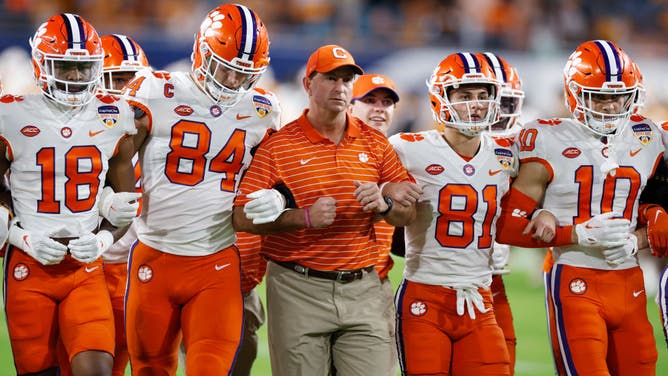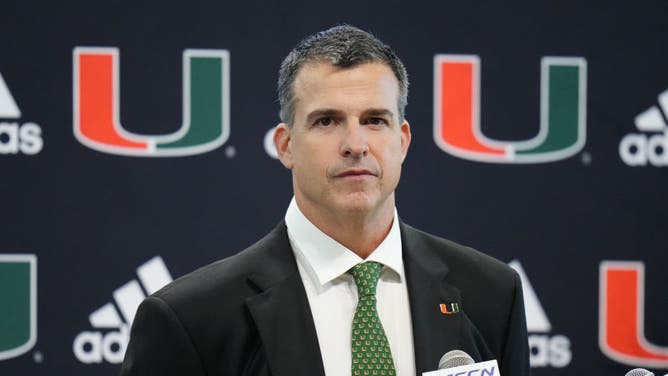Cracks In ACC Armor: AD's Told Not To Speak With Media On Monday, But The 'ACC 7' Are Now Creating Enough Noise
The start of ACC meetings in Florida on Monday presented the first opportunity for all members to sit with each other as reports emerged about seven schools looking for a way out. If the ACC was looking to make some noise this Spring, I'd say the mission was accomplished.
It's been reported in the past that a number of schools were looking for a way to get out of the ACC's grant of rights deal. This current deal, that doesn't end until 2036, has been a hot topic over the past several months. Schools led by Florida State and Clemson are dissecting the deal looking for a way out or additional revenue. But it's not only money that was discussed, each of the seven institutions are seeking loopholes that could lead to a hidden tunnel out of the conference.
Talk of conference realignment is not a surprising topic, given that the past three years in college football have made numerous schools take a hard look at their situation. As the SEC and Big Ten continue to grow and prepare to cash-in on new television contracts, its left numerous ACC schools searching for another pot of gold.

Clemson Tigers head coach Dabo Swinney locks arms with his players prior to the Capital One Orange Bowl against the Tennessee Volunteers on December 30, 2022 at Hard Rock Stadium in Miami Gardens, Florida. (Photo by Joe Robbins/Icon Sportswire via Getty Images)
The 'ACC Seven' Unveil Themselves, Now The Battle Continues
The obvious sticking point is the current television agreement with ESPN, but the unmasking of the seven schools looking for a way out provided clarity to the backdoor scuttlebutt. Over the past few months, Greensboro, NC has been the go-to spot for lawyers representing the 'Secret Seven.' On Monday, those schools were finally announced, thanks to Brett McMurphy. It was also noted that Commissioner Jim Phillips instructed AD's to not speak with the media as they left the ballroom.
As reported on Monday, Clemson, Florida State and Miami have been leading the charge in developing a new revenue model for the conference. Joining them in the fray are North Carolina State, Virginia Tech, Virginia and North Carolina. Talk outside of the conference rooms between officials on Monday centered around a few particular scenarios that could be presented.
Even though this move has not been assured that it would work, officials from the seven schools have been researching whether or not the grant of rights would dissolve if half of the member institutions left at the same time. Could this plan work? It's tricky, given how iron-clad this contract is with the ACC. The simple fact is that if there were loopholes in the grant of rights deal, a number of schools would've already left.
But this hasn't stopped numerous member institutions from continuing to present ideas. Also, the fact that we've gotten this far and attorneys have been racking up hours in Greensboro, should tell the public how serious these schools are.
Could all of this be a negotiating tactic for some schools, mainly FSU, Clemson and Miami to receive more money in an uneven revenue split? Absolutely. But there are problems with the plan for the other four schools. It's not as if the SEC or Big Ten would come calling for North Carolina State or Virginia, as an example. So, simply leaving the conference would not work.
Each school in the ACC receives just over $36 million per year from the ESPN deal, but Florida State and Clemson have made it known they want more. Even if it comes at the ramification of uneven revenue sharing, the Seminoles don't care. Florida State is obviously one of the biggest draws of the conference, from a ratings standpoint. Clemson can say the same, while Miami tries to dig itself out of a hole and back into relevancy.
If Clemson or Florida State are ready to leave the conference, the school better start passing around the offering plate. The $120 million buyout fee that they would have to pay doesn't include the loss of revenue from their future media deals, which they would owe the ACC for the next 13 years.
Also, each school will be making around $30 million less per year than what Vanderbilt will make in its new television agreement. Think about that one for a minute. Vanderbilt will be netting around $72 million per year, while Florida State is bringing home half of that.

Head Coach Mario Cristobal of the Miami Hurricanes. (Photo by Mark Brown/Getty Images)
What's Next For ACC Meetings This Week? Numbers, Strategy
ACC Commissioner Jim Phillips will look to play problem solver, but this discussion will continue to be contentious between member institutions. The best thing for the other schools that haven't been scouring for a way out is to stick together.
The numbers will continue to be presented in a group setting, like Florida State claiming they make up almost 15% of the ACC's current value. Athletic Director Michael Alford said that the school only receives around seven percent of the current revenue stream. So, as each school gives its presentation on what they bring to the table, expect things to get even hotter in the sunshine state over the next two days.
One of the things ACC Commissioner Jim Phillips will have a hard time doing today is keeping athletic directors from talking. He asked leaders to stay away from the media on Monday, but there are some AD's foaming at the mouth to get their perspective out to the masses.
If Florida State and Clemson are going to try to take the spotlight this week, other ACC schools better start talking soon. Because if this keeps going down the path its currently on, history will prove that this week in Florida was the turning point for the ACC.
Just when you thought the SEC scheduling model was going to be the hot topic this off-season, the ACC's 'Silent Seven' come storming in.